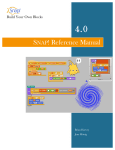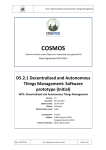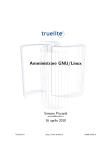Download Service & Support
Transcript
Cover
Tips and Tricks to SIMATIC SIPAT
SIMATIC SIPAT
FAQ June 2010
Service & Support
Answers for industry.
Question
This entry is from the Service&Support portal of Siemens AG, Sector Industry,
Industry Automation and Drive Technologies. The general terms of use
(http://www.siemens.com/terms_of_use) apply.
Clicking the link below directly displays the download page of this document.
http://support.automation.siemens.com/WW/view/en/<ID-Number>
Question
Tips and Tricks to SIMATIC SIPAT
Answer
The instructions and notes listed in this document provide a detailed answer to this
question.
2
FAQ title
Version , Item-ID: ID-number
Table of content
Table of content
1
Logon to SIPAT.................................................................................................. 5
1.1
1.2
1.3
1.4
1.5
2
Database............................................................................................................. 7
2.1
2.2
2.3
2.4
2.5
2.6
2.7
3
3.2
After re-import of exported data to CSV, the data type of my single
value data has changed. .................................................................... 11
I get an "Out of memory" exception on export of runtime data to XML
format ................................................................................................. 11
Mehtods ............................................................................................................ 12
4.1
4.2
4.3
5
All data is present in the central database but I do not see certain
configuration / stations / runtime data in the client?............................. 7
I am unable to start the SIPAT Database Logger service.................... 7
My runtime data is not stored in the central database? ....................... 7
My SIPAT client cannot connect to the database ................................ 7
The APPLY process running on the archive database is going to
status ABORTED on start apply process ............................................. 8
Where do I change the central database / local store database
connection? .......................................................................................... 8
What SIPAT database scripts should I re-execute in case of SQL
server database backup / restore or detach / attach action? ............... 9
Export/Import ................................................................................................... 11
3.1
4
I am unable to logon to SIPAT client. I get an error message "No data
domains configured for this user." in the client logon screen............... 5
I cannot logon to the SIPAT client. I am unable to select a PAT role in
the logon screen................................................................................... 5
I am unable to logon using the workflow importer tool......................... 5
Why do I see a login prompt when I start SIPAT? How can I configure
this? ...................................................................................................... 6
I have locked my user when trying to logon to SIPAT. What should I
do?........................................................................................................ 6
When I (re)start my method, the first value(s) of a non reference
collector is marked as missing. After some first measurements, all is
running smoothly. ............................................................................... 12
My station is running but I am unable start any of the methods I
select? I get an errormessage “Method does not exist”..................... 12
My method is acquiring data from different collectors running on
separate collector stations. During method runtime, I restarted one of
our collector station PC's due to a malfunction of a SCADA system.
My collector running on this station is not activated automatically? .. 12
SIPAT services................................................................................................. 14
5.1
5.2
5.3
5.4
5.5
5.6
5.7
5.8
FAQ title
Version , Item-ID: ID-number
Consistency report complains about an unexisting PAT ID after you
have altered your method configuration, e.g. after removing a
calculation from your method configuration. ...................................... 14
SIPAT services are starting slow ....................................................... 14
After re-start of PC, not all SIPAT services startup automatically...... 14
The SIPAT station service will not start.............................................. 15
A SIPAT service other then the station service is not starting ........... 15
The station service is running but the console indicates the station is
in stopped or disconnected state. What can cause this?................... 16
The SIMATIC SIPAT service is creating loads of rolling.log files which
results in decreasing disk space. ....................................................... 16
What services are needed? ............................................................... 16
3
Table of content
5.9
5.10
6
Collector ........................................................................................................... 18
6.1
6.2
6.3
6.4
7
7.2
7.3
7.4
Why can’t I configure a model calculation?........................................ 21
My configured model calculations are not performed during method
runtime? ............................................................................................. 21
General Topics................................................................................................. 22
9.1
9.2
9.3
9.4
9.5
9.6
9.7
9.8
9.9
4
Where can I find all required software which is missing on the
SIMATIC SIPAT Master CD? ............................................................. 19
Is it possible to install SIPAT outside a corporate domain? i.e.
installing SIPAT in a workgroup environment .................................... 19
Why do I need a SIPAT collector station installed? ........................... 19
What should I keep in mind when upgrading the SIPAT system to
version 3.0 or higher?......................................................................... 20
Model calculation............................................................................................. 21
8.1
8.2
9
My values entered manually for a manual collector are not measured18
My collector is not activated automatically on start method............... 18
Why does the regular OPC collector work but the OPC async collector
does not?............................................................................................ 18
I have OPC issues when trying to measure from an Expo ePAT
instrument........................................................................................... 18
Software / Install .............................................................................................. 19
7.1
8
Do I need a workflow service and where should it be running?......... 17
I am unable to make connection / see services when connecting to a
host in the service manager of the administration module in the SIPAT
client. .................................................................................................. 17
Where do I configure the Station name?............................................ 22
When performing an electronic signature, my username is not
recognized?........................................................................................ 22
I am unable to filter (fetch) a large amount of data, for example 100
000 data rows, using the model builder. I get a handled exception or
error message like "Object reference not set to an instance of an
object"................................................................................................. 23
What are the prerequisites for SIMATIC SIPAT user?....................... 23
Why is the PAT role "PAT Execution Module" used? ........................ 24
Why are my stations / a station not visible in the console?................ 24
I am unable to define a negative value in the formula editor of a basic /
advanced calculation, e.g. -1 + <PAT ID> is not valid. ...................... 24
In the model builder, I filter on "Start time (UTC)" or "Start time
(Local)", but the filter returns no data?............................................... 24
SIPAT client PC is running very slow................................................. 25
FAQ title
Version , Item-ID: ID-number
1 Logon to SIPAT
1
Logon to SIPAT
1.1
I am unable to logon to SIPAT client. I get an error
message "No data domains configured for this user."
in the client logon screen.
Validity
SIMATIC SIPAT version 3.0 or higher.
Instruction
Verify the configuration in table PTDDUSER of the central database. The data
entered in column USER_ID should be in capital letters.
Verify the data domain configured for your user. If you try to logon to a client which
is installed on a workstation, check whether the data domain configured for your
workstation is compatible with the data domain defined for your login user or user
group.
Also, consult the Application Event Viewer and SIPAT client rolling.log files to
extract more information.
1.2
I cannot logon to the SIPAT client. I am unable to
select a PAT role in the logon screen.
Instruction
Verify your configuration in table PTROLES of the central database. Verify your
user credential or group of which you are member of has the necessary PAT roles
assigned.
Verify the data present in column WINDOWS_GROUP of table PTROLES is in
capital letters (SIMATIC SIPAT version 3.0).
1.3
I am unable to logon using the workflow importer tool
Instruction
Verify the database connection settings in the workflow importer tool logon window
are correct.
Check the logon user. The logon user used for the workflow importer tool is not a
Windows Authenticated user but the SIPAT database user à User = SIPAT
If you are using a SIPAT version on which uses the database connection string
defined in the workflow importer configuration file
(Siemens.PAT.Tools.WorkflowImporter.exe.config), verify the connection string is
correct (password of SIPAT user is not encrypted!).
<add provider="SqlServer" database="<database name>"
timeout="300" dbtype="CentralDatabase"
integratedsecurity="false" username="<sipat user>"
password="<sipat password>" name="CentralDatabase"
server="<server name>"/>
FAQ title
Version , Item-ID: ID-number
5
1 Logon to SIPAT
Save the file and re-start the workflow importer tool.
1.4
Why do I see a login prompt when I start SIPAT? How
can I configure this?
Instruction
A SIPAT client login window can be configured in the client configuration file. This
file can be configured using the SIPAT configuration tool (preferred) which is
provided with a SIPAT installation.
In the SIPAT configuration tool, the setting is called LogonWindow and can be
found in the Application Settings of the ...PAT
Client\Siemens.PAT.Client.exe.Config node.
By default installation, the LogonWindow is set to False.
The first time you startup a SIPAT client after installation, the logon window will
popup. Reason for this is the default PAT role and Operator Screen which must be
set at first logon.
If you get this login window next time at startup of the client and the LogonWindow
setting is set to False, this indicates there is a problem with the database
connection or the Windows OS logon user is unable to logon to SIPAT.
1.5
I have locked my user when trying to logon to SIPAT.
What should I do?
Instruction
Your user account must be unlocked in order for you to login again.
This unlocking is performed in table PTLOGINLOCKED of the central database.
Value of column NUMBER_OF_ATTEMPTS for your USER_ID should be re-set to
value 0.
The number of attempts for which a user can provide a (wrong) password before its
account is locked is configured in table PTSYSTEM of the central database,
system setting LOCK_USER_AFTER.
6
FAQ title
Version , Item-ID: ID-number
2 Database
2
Database
2.1
All data is present in the central database but I do not
see certain configuration / stations / runtime data in
the client?
Instruction
Verify your configuration in table PTROLES of the central database. Verify your
user credential or group of which you are member of has the necessary PAT roles
assigned.
Verify the data present in column WINDOWS_GROUP of table PTROLES is in
capital letters (SIMATIC SIPAT version 3.0).
2.2
I am unable to start the SIPAT Database Logger
service.
Instruction
Verify the local store database service and the SIPAT Watchdog service are
running (by default this is MS SQL Express). The SIPAT Database Logger service
is dependent on the local store database and on the SIPAT Watchdog service.
Verify the service user is a known user to SIPAT database, has sufficient rights and
has PAT role PAT Execution Module assigned (configuration in table PTROLES of
the central database).
We have also experienced cases where you need to re-enter the service user
password and try to re-start the service.
Check eventviewer and rolling.log files present in the SIPAT database logger
installation folder to acquire more information why you are unable to start the
DBLogger service.
2.3
My runtime data is not stored in the central database?
Instruction
Check the status of your SIPAT Database Logger service, is the service running?
Are there still unprocessed records in the local store database of the method base
station? If so, wait till all records are processed. This can be verified in table
PTDBREQ of the local store database. Also, check the status of these records
when still present in the local store. If they have status (column SS) = 3, which is
error status, contact SIPAT support.
Is the correct central database defined in the SIPAT Database Logger
configuration file?
2.4
My SIPAT client cannot connect to the database
Instruction
Does your SIPAT client logon user have access to the central database?
FAQ title
Version , Item-ID: ID-number
7
2 Database
Verify the Windows OS user can access the central database. This OS user is
initially used to establish connection to the central database for checking the client
login user credentials configured in the database.
Verify table PTROLES in the central database is correctly configured. If not, you
are unable to select a PAT Role, or the preferred PAT Role, at the login window of
the SIPAT client.
If you get an error message indicating your user has been locked out, check table
PTLOGINLOCKED of the central database and unlock your user by setting the
value of NUMBER_OF_ATTEMPTS to 0. The max number of attempts which is
allowed for any user is configured in table PTSYSTEM.
If you get an error message indicating no data domains are configured for your
user, verify the configuration in table PTDDUSER for your user. The data entered
in column USER_ID should be in capital letters. Verify the data domain configured
for your user. If you try to logon to a client which is installed on a workstation,
check whether the data domain configured for your workstation is compatible with
the data domain for your login user. (As of SIMATIC SIPAT version 3.0)
Check the Windows Event Viewer (application) or client logging for more
information why you are unable to log on.
2.5
The APPLY process running on the archive database is
going to status ABORTED on start apply process
Instruction
Contact your DBA. Below a summary of possible example actions which could be
undertaken:
Look at the SIPAT_APPLYERRORS logging (logon with STRADMIN to the archive
database using sqlplus or TOAD and run following query: select * from
dba_apply_error).
This logging will provide you with the details of why the apply process is going too
aborted state.
In case the logging indicates there is a primary key violation for a certain
transaction ID, verify manually if the whole record data of the failed transaction is
indeed already present in the archive database.
If the error is a primary key violation and the data has been verified, the transaction
can be removed from the apply error queue. (logon with STRMADMIN and
execute: EXEC DBMS_APPLY_ADM.DELETE_ERROR('<Transaction ID>'))
Try to re-start the apply process and verify the status of the apply process.
2.6
Where do I change the central database / local store
database connection?
Instruction
The database connection for a certain SIPAT service is configured in the service
configuration file (extention .config) which is present in the service installation
directory.
This configuration file can be configured using the SIPAT configuration tool
provided when installing SIPAT (preferred) or changed manually (not preferred).
8
FAQ title
Version , Item-ID: ID-number
2 Database
Using the configuration tool, you will find the database connection settings in the
node SIPAT DataAccess of the corresponding SIPAT service. (note: for Oracle
database connection, setting Server should not be defined, setting Database
should be the name as defined in the TNS names).
If you decide not to change the database connection using the configuration tool
but directly in the configuration file, you need to configure an entry like:
<Siemens.PAT.DataAccess.Configuration name="SIPAT
DataAccess1">
<instances>
<add provider="SqlServer" server="localhost\sqlexpress"
database="SIPAT_LOCAL" timeout="300" dbtype="LocalStore"
integratedsecurity="true" name="LocalStore"/>
<add provider="SqlServer" database="ORIG2100"
timeout="300" dbtype="CentralDatabase"
integratedsecurity="true" name="CentralDatabase"
server="NNVH040A"/>
</instances>
</Siemens.PAT.DataAccess.Configuration>
NOTE
2.7
With a default SIPAT installation, the local store database for your station (or
other SIPAT service which require a local store database) is by default set to
server "localhost\SQLExpress" and database "SIPAT_LOCAL".
What SIPAT database scripts should I re-execute in
case of SQL server database backup / restore or
detach / attach action?
Instruction
Following instruction is valid for SIPAT version < 3.1. It might be possible that the
description below does not map completely for your current SIPAT installation, in
which case, please contact SIPAT support.
First thing to do is to set the SIPAT user as DBO (database owner). Logon as SA
user onto the central database and execute following script as below. Before
executing, adapt <DATABASE_NAME> and <SIPAT_USER> to correct value in
script.
USE [<DATABASE_NAME>]
-- SET SIPAT AS DBO
exec sp_changedbowner '<SIPAT_USER>'
PRINT '<SIPAT_USER> is now owner of <DATABASE_NAME>'
GO
The script above in as extract from database script 1. SA - Assembly.sql present
on the master CD (Master CD\...\SqlServer\Clean Install\Central Db\01. Install\).
Next thing to do is to re-create the stored procedures in the central database.
Execute following scripts as listed below as described in the SIPAT installation
manual. These scripts can be found on your SIPAT master CD on following
location Master CD\... \SqlServer\Clean Install\Central Db\01. Install\. Follow
instructions as described in the SIPAT installation manual.
FAQ title
Version , Item-ID: ID-number
9
2 Database
1./ 1. SA - Assembly.sql
2./ 5. SIPAT - Create Stored Procedures.sql
You should be able to run SIPAT again. Contact SIPAT support in case of
additional information.
10
FAQ title
Version , Item-ID: ID-number
3 Export/Import
3
Export/Import
3.1
After re-import of exported data to CSV, the data type
of my single value data has changed.
Instruction
As long as the data is stored in the SIPAT database, we are aware of its data type.
But, the data type information is not exported to the CSV file, so that information is
lost.
Currently, single value data is imported as data type double in order not to lose
data information in the model builder / data miner of SIPAT.
3.2
I get an "Out of memory" exception on export of
runtime data to XML format
Instruction
During the export of method runtime data to XML format, a query is executed on
the database to fetch the runtime data. This runtime data is kept in memory during
this process. When all runtime data is fetched, the data is saved to the runtime
data XML files.
If a client PC does not have sufficient available physical memory during this
fetching data process, it is possible an out of memory exception is raised.
Close all non-used applications on the client PC in order to get as many available
memory for this export functionality, expand the physical memory on the client PC
or use a client running on a PC having more memory available.
FAQ title
Version , Item-ID: ID-number
11
4 Mehtods
4
Mehtods
4.1
When I (re)start my method, the first value(s) of a non
reference collector is marked as missing. After some
first measurements, all is running smoothly.
Instruction
When using multiple (collector) stations in your method, verify if the PC-time of all
stations is aligned.
When the collectors are not used by multiple methods, uncheck the 'Synchronise
with other methods' checkbox.
Check your method configuration for an acceptable validity range (positive and
negative) for your PAT ID's.
4.2
My station is running but I am unable start any of the
methods I select? I get an errormessage “Method does
not exist”.
Instruction
Most probably, your station is configured / pointing to an other central database
then the SIPAT client is pointing to.
Check the database configuration of your station. Start the SIPAT configuration tool
provided when a SIPAT component is installed and go to the
…\Siemens.PAT.Operation.Station.Service.exe.config, open the
SIPAT.DataAccess node.
Verify the configuration for CentralDatabase is configured correctly. If not, set the
central database conifguration values correct, save and re-start the station service.
4.3
My method is acquiring data from different collectors
running on separate collector stations. During method
runtime, I restarted one of our collector station PC's
due to a malfunction of a SCADA system. My collector
running on this station is not activated automatically?
Instruction
This is as designed. When a method acquiring data and the collector station is restarted, the collector running on this collector station will not start measuring again
on (re-)startup collector station. In that case, the method must deactivate / reactivate and re-start to acquire data again from this collector.
If the collector running on the re-started collector station is the reference collector,
the method will stop after a pre-defined time. User must deactivate and re-activate
method to acquire data from this collector in a future method runtime.
Our plan is to revise the exception handling in a future version of SIMATIC SIPAT.
12
FAQ title
Version , Item-ID: ID-number
4 Mehtods
FAQ title
Version , Item-ID: ID-number
13
5 SIPAT services
5
SIPAT services
5.1
Consistency report complains about an unexisting
PAT ID after you have altered your method
configuration, e.g. after removing a calculation from
your method configuration.
Instruction
Check if this "unexisting PAT ID" was previously configured in a user function
defined in your method configuration.
Problem is you will not see the non-existing PAT ID anymore in the user function
configuration and you will not be able to correct this configuration.
If so, a resolution is to remove the user function and re-configure it.
5.2
SIPAT services are starting slow
Instruction
When a SIPAT service is started, .NET tries to verify the authenticode signature at
load time. This can cause delays during startup when the computer does not have
an internet connection.
This can be avoided by adding the next snippet in the configuration files (extention
.config) of the SIPAT services. These configuration files are located in the
installation directory of the SIPAT component.
<configuration>
<runtime>
<generatePublisherEvidence enabled="false"/>
</runtime>
</configuration>
5.3
After re-start of PC, not all SIPAT services startup
automatically
Instruction
Most of the SIPAT services are dependent on the local store database (by default
the SQLExpress). When one of those SIPAT services is starting and the local store
database service ( SQLExpress) is not running yet, the service is unable to start.
A list of the SIPAT services and their dependencies can be found in the SIPAT
documentation provided with your SIPAT master CD.
Resolution is to define dependencies in the registry. To do this, open a registry
enditor and select the sub key of the service you would like to create the
dependency for. This can be found in following path:
…\HKEY_LOCAL_MACHINE\SYSTEM\CurrentControlSet\Services\<Servi
ce name>
If the key is not present it can be added by right clicking and selecting New, MultiString Value. This key should be named DependOnService. Then add the value for
14
FAQ title
Version , Item-ID: ID-number
5 SIPAT services
the local store database server, by default SQL Server Express , typically:
MSSQL$SQLEXPRESS.
More information on how to add dependencies can be found in the SIPAT
installation manual or http://support.microsoft.com/kb/193888.
5.4
The SIPAT station service will not start
Instruction
Verify following items:
Check the station configuration file for correct station name with station version as
defined in central database or client, connection to local store and central
database.
Does the service user account have access to the central database and local store
database?
The service user has PAT Execution Module role assigned in table PTROLES of
central database?
Is the service user account allowed to run services, has sufficient rights to the
service installation folder (check the SIPAT prerequisite document) and is the
provided password correct?
Go to the Windows event viewer (start --> run --> eventvwr). In the application
event viewer you will find error entries of why the station service was unable to
start. You will find the real cause of the problem most probably in the third error
message listed for your station service in the application eventviewer.
5.5
A SIPAT service other then the station service is not
starting
Instruction
Verify if the service user account has permission to run the service.
Is the password defined for the service user correct? We have also had cases that
you need to re-type the password of the service user in the Services of Windows,
even though it was initially entered correctly.
Open the service configuration file using the SIPAT configuration tool provided with
an installation of SIPAT and verify the connection to the central and local store
database is configured correctly.
Has the SIPAT watchdog service been able to start? All other services are
dependent on the SIPAT watchdog service. If this service is unable to start, no
SIPAT services will be able to do so.
Most of the SIPAT services are dependent on the local store database (by default
the SQLExpress). When this SIPAT service is starting and the local store database
service is not running, the service is unable to start.
Does the service user account has access to the central and local database if
required?
The service user has PAT Execution Module role assigned in table PTROLES of
central database?
Does the service user have sufficient rights to the service installation folder (check
the SIPAT prerequisite document)?
FAQ title
Version , Item-ID: ID-number
15
5 SIPAT services
Check the Windows Event Viewer (Application) and the rolling.log files present in
the service installation folder to investigate the cause of what is or went wrong.
5.6
The station service is running but the console
indicates the station is in stopped or disconnected
state. What can cause this?
Instruction
There might be multiple causes for this problem:
Is there a firewall blocking communication between client and station? Verify this
by starting up a client on the station server, if the station is visible there, then a
firewall might be blocking communications.
Is there a connection to the station? Try pinging the station from the client PC.
Check IP / hostname. Try DNS resolving.
Can you see and check the status of the services using the services manager
functionality present in the administration module of the SIPAT client?
Try refreshing the console. Right click on the "stopped" station and refresh. It might
also be a latency issue.
5.7
The SIMATIC SIPAT service is creating loads of
rolling.log files which results in decreasing disk space.
Instruction
By default, logging is enabled for all service. These logging files can take up
several gigabytes of disk space in time depending on how intensive these services
are used. An administrator should keep track of these files, and delete them from
time to time.
It is also possible to diminish the logging to only warnings and errors or redirect
more logging to the system event viewer.
This can be changed using the SIPAT configuration tool.
Consult the SIPAT installation and user manual provided with your SIPAT Master
CD for more explanation and how to configure this logging in the services and
client configuration file.
5.8
What services are needed?
Instruction
The list of SIPAT components which should be installed on a computer is
dependent on the set up of your SIPAT architecture.
For example:
The minimum required installed SIPAT services for running a station are the
Watchdog service, Station service and Database Logger. If this is a collector
station, the Workflow service should be installed as well, and so on…
No SIPAT components should be installed on the central database server.
16
FAQ title
Version , Item-ID: ID-number
5 SIPAT services
When running the operator screen on a SCADA system, the Operator screen
service and Watchdog service should be installed on that SCADA system.
5.9
Do I need a workflow service and where should it be
running?
Instruction
The SIPAT Workflow service should be installed on the station on which the
method workflow or collector intervention is running.
For example:
When executing a collector intervention, the workflow service should be installed
on the (collector) station on which the collector is running.
If you are executing a method workflow during the method prepare step, the
workflow service should be installed on the base station on which the method is
running.
5.10
I am unable to make connection / see services when
connecting to a host in the service manager of the
administration module in the SIPAT client.
Instruction
Multiple items might be causing this.
Is there a firewall blocking the communication?
Does the service user of the watchdog service have rights to see the services of
the host PC? This can be checked by connecting to another host from the
Windows Services using the SIPAT Watchdog service user credentials.
Try DNS resolving.
FAQ title
Version , Item-ID: ID-number
17
6 Collector
6
Collector
6.1
My values entered manually for a manual collector are
not measured
Instruction
PAT ID's defined for a manual collector are also liable to validity range (positive
and negative).
Make sure you enter a valid timestamp when updating the manual data in the
console or use the update timestamp functionality when entering a value for your
manual collector. This is by right clicking and select update timestamp in the
manual data window of the console, the timestamp of your manually entered value
will be automatically set to current timestamp.
6.2
My collector is not activated automatically on start
method
Instruction
A collector will only activate automatically start of method or on prepare of method.
If you stop a method and deactivate the collector or for example re-start the
collector station, the method will not re-activate the collector automatically on start
or prepare method. You will need to deactivate and re-activate the method.
6.3
Why does the regular OPC collector work but the OPC
async collector does not?
Instruction
It might be possible that synchronous OPC calls work but asynchronous calls fail.
This can be checked with any OPC client.
If the OPC client can connect to the OPC server and SIPAT fails to acquire data
from the same OPC server, a possible cause might be that SIPAT is using
asynchronous communication (OPC async collector). I.e. authentication from client
to server works but server to client fails.
6.4
I have OPC issues when trying to measure from an
Expo ePAT instrument.
Instruction
When working with the ePAT (embedded computer in a workgroup) it is necessary
to configure DCOM from a workgroup to a domain.
To make this work, a local account must be made on both the client as the server
with the same username and password. This account can then be used for
authentication.
18
FAQ title
Version , Item-ID: ID-number
7 Software / Install
7
Software / Install
7.1
Where can I find all required software which is missing
on the SIMATIC SIPAT Master CD?
Instruction
As of SIPAT version 3.0, the majority of the external software is no longer provided
by the SIMATIC SIPAT master CD or SIPAT setup.
So where can you find the required software for running SIPAT?
The .net framework and the SQL Server express can be downloaded from the
Microsoft site.
All other required software DLL's should be provided with the supplied SW of the
supplier being for example Umetrics, Mathworks, CAMO, ...
For most collectors, the SDK (software developer kit) is needed and/or software
provided by the supplier, for example Thermo RESULT, Expo NovaPAC, ABB
Michelson Ethernet Adapter, .... This will be mentioned in the installation manual of
the productivity pack.
When upgrading your existing SIPAT system to version 3.0, the easiest way to
obtain the missing DLL’s is to copy all non-Siemens DLL’s present in the
installation directory of the installed SIPAT components to another directory before
uninstalling the “old” SIPAT version.
7.2
Is it possible to install SIPAT outside a corporate
domain? i.e. installing SIPAT in a workgroup
environment
Instruction
It is possible to install SIPAT onto a workgroup environment but please take note of
following items.
All computers will need a functional account (a SIPAT service user) which has to
be local. All users, i.e. service users and client users, must be created on all
workgroup computers with same name and same password.
These users must also be created as local account onto the database server as the
database will use Windows Authentication. There is also a possibility to use SQL
Authentication.
7.3
Why do I need a SIPAT collector station installed?
Instruction
The purpose of a SIPAT Collector Station is to run a collector (or multiple) which
will measure data from an instrument, OPC server, … A general rule is to install the
collector station as close to the data source (instrument, OPC server, …) as
possible. One of the reasons is to avoid DCOM issues, authentication on the OPC
host, ….
If it ever should be necessary to use DCOM (e.g. when using an ePAT system,
acquiring data from an Expo ePAT instrument), check the local policies, corporate
policies and authentication in the component manager.
FAQ title
Version , Item-ID: ID-number
19
7 Software / Install
7.4
What should I keep in mind when upgrading the SIPAT
system to version 3.0 or higher?
Instruction
As of SIPAT version 3.0, the majority of the external software is no longer provided
by the SIMATIC SIPAT master CD or SIPAT setup.
So when upgrading your existing SIPAT system to version 3.0, the easiest way to
obtain the missing DLL’s is to copy all non-Siemens DLL’s present in the
installation directory of the installed SIPAT components to another directory before
uninstalling the “old” SIPAT version.
The non-Siemens DLL's can be restored to its applicable SIPAT installation
directory once the new SIPAT version is installed. That way you will save yourself a
lot of time in searching for the necessary external DLL's.
Also, do not forget to run the SIPAT installation checker tool after your installation
of the new SIPAT version. This tool will verify if all necessary external (3rd party)
DLL's are present in the SIPAT installation folders.
20
FAQ title
Version , Item-ID: ID-number
8 Model calculation
8
Model calculation
8.1
Why can’t I configure a model calculation?
Instruction
Verify that the calculation service is running on the Host you have defined in the
calculation model definition.
Is the license you have obtained for the chemometric package still valid? (e.g.
Umetrics, Camo, ...). This information will also be displayed in the rolling.log files of
the calculation service.
Check the eventviewer and the rolling.log files of the calculation service to find
more information of why you cannot configure your model.
8.2
My configured model calculations are not performed
during method runtime?
Instruction
Verify that the calculation service is running on the Host you have defined in the
calculation model definition.
Is the license you have obtained for the chemometric package still valid? (e.g.
Umetrics, Camo, ...). This information will also be displayed in the rolling.log files of
the calculation service.
Verify the alarm which is raised during method execution in the console for more
information.
Check the eventviewer and the rolling.log files of the method station and
calculation service to find more information of why the calculation was unable to be
executed.
FAQ title
Version , Item-ID: ID-number
21
9 General Topics
9
General Topics
9.1
Where do I configure the Station name?
Instruction
The station name is configured in the SIPAT client in the station object definition
(setting Name for the station name and setting Host for the computer name on
which the station service is running) and in the configuration file of SIPAT station
service (which is located in the station installation directory).
Both names, defined in the client and station configuration file, must correspond in
order for the station service to start up.
In earlier SIPAT versions, the station name in the station installation directory was
defined in the Default.sipatconfig file. In later SIPAT versions, you can find this
setting in the Siemens.PAT.Operations.Station.Service.exe.config file which can
also be configured using the SIPAT Configuration tool (node Application Settings in
the ....Station.Service.exe.config) provided when installing SIPAT. We prefer to use
this configuration tool for all changes needed to service configuration files.
Also, make sure the station version defined in the station configuration file is
correct! By default, this is not set to a fixed station version but to the Highest station
version as configured in the SIPAT client.
Entry in station configuration file (irrelevant when using the SIPAT configuration
tool):
<add key="BaseStation" value="<station name>"/>
<!-- The Base station version of this config file.
possible values: String or empty-->
<add key="BaseStationVersion" value="<highest>"/>
<!-- The Base station version reference of this config
file.
possible values:
"Current","Highest","VersionString"-->
<add key="BaseStationVersionReference"
value="VersionString"/>
9.2
When performing an electronic signature, my
username is not recognized?
Instruction
A user name in an electronic signature should be defined as: DOMAIN\USER.
When working on a local system, i.e. local users in a workgroup, user must
authenticate itself as: COMPUTERNAME\USER
22
FAQ title
Version , Item-ID: ID-number
9 General Topics
9.3
I am unable to filter (fetch) a large amount of data, for
example 100 000 data rows, using the model builder. I
get a handled exception or error message like "Object
reference not set to an instance of an object".
Instruction
When fetching a large amount of data using the model builder, a large amount of
physical memory will be used by the SIPAT client. This can be monitored in the
task manager. Verify if your client PC has sufficient memory to perform the action
in the model builder.
It is also possible that a timeout occurs while the filter is executing the filter query
onto the database. This timeout setting is defined in the SIPAT client configuration
file and the value can be enlarged by using the SIPAT configuration tool provided
with your SIPAT installation. By default, the timeout is set to 300 seconds.
To change the timeout setting, open the SIPAT configuration tool and go to
.....\PAT Client\Siemens.PAT.Client.exe.Config node SIPAT DataAccess1. In the
CentralDatabase section you will find the setting TimeOut in the Configuration box.
Enlarge this value to for example 1000 seconds, save the configuration file and restart the SIPAT client. It might be possible that you need to change it to a larger
value again if 1000 is not sufficient.
If both solution as mentioned above are not solving the issue or are not related to
your problem, check the Windows Application Event Viewer for more information
present in the error messages and the client rolling.log file.
9.4
What are the prerequisites for SIMATIC SIPAT user?
Instruction
User must be a domain user. SIMATIC SIPAT uses Windows Authentication to
verify if a user has access to SIPAT.
User must have the database roles SIPAT_READ and SIPAT_WRITE. (see SIPAT
installation manual for exact database roles for your specific SIPAT version).
User must at least have 1 PAT role assigned for login. This can be configured in
table PTROLES of the central database.
Modify rights on the SIPAT installation folders.
When working with Oracle database, it is also required to have modify rights on the
Oracle home installation directory.
In order to run the SIMATIC SIPAT application as a non administrator user,
following permissions should be set:
1./ Full control is given to the next registry entry:
HKEY_LOCAL_MACHINE\SOFTWARE\Siemens
2./ SIMATIC SIPAT performance counters are created in the registry key:
HKEY_LOCAL_MACHINE\ SOFTWARE\Microsoft\Windows
NT\CurrentVersion\Perflib\003
The created performance counters are:
ReplayCounter;SerializeCounter;DeserializeCounter
FAQ title
Version , Item-ID: ID-number
23
9 General Topics
9.5
Why is the PAT role "PAT Execution Module" used?
Instruction
The PAT role "PAT Execution Module" is by default used for the SIPAT service
user. E.g. a SIPAT station will not start if the station service user is not a member
of the PAT role "PAT Execution Module".
9.6
Why are my stations / a station not visible in the
console?
Instruction
This can have multiple causes:
Is there a firewall blocking communication between client and station? Verify this
by starting up a client on the station server, if the station is visible there, then a
firewall might be blocking communications.
Is there a connection to the station? Try pinging the station from the client PC.
In case data domains (as of SIMATIC SIPAT 3.0) are configured, check your data
domain configuration (station / user / workstation). Data domain configuration for
your user or user group can be defined in table PTDDUSER of the central
database. Data domain configuration for SIPAT objects can be performed in the
client.
Verify your configuration in table PTTK of the central database. In this table, you
configure what stations are visible for what user or user group. By default, all
stations are visible for all SIPAT users having access to the console.
9.7
I am unable to define a negative value in the formula
editor of a basic / advanced calculation, e.g. -1 + <PAT
ID> is not valid.
Instruction
There is indeed a small problem with negative values in a formula editor, but there
is a workaround:
E.g. -1 + <PAT ID> will not work.
E.g. (0-1) + <PAT ID> will work.
This problem is logged in our bug tracking system and will be solved in a later
version of SIPAT.
9.8
In the model builder, I filter on "Start time (UTC)" or
"Start time (Local)", but the filter returns no data?
Instruction
The filter fields "Start time (UTC)" and "Start time (Local)" are context fields and
thus are not always filled in.
24
FAQ title
Version , Item-ID: ID-number
9 General Topics
Do not confuse these context fields with filter fields "Start Data UTC" and "Start
Data Local" which are method property fields. These fields always have a value per
method runtime.
9.9
SIPAT client PC is running very slow.
Instruction
If SIPAT clients are regularly opened and closed on this PC, it might be possible
that multiple client processes are still running.
Go to the task manager, tab Processes and kill all not used still running
Siemens.PAT.Client.exe processes.
Check the memory and CPU consumption of all running applications. Check the
available physical memory.
Check the available disk space on your computer. Maybe the available disk space
has decreased to a critical level due to SIPAT logging present in the installation
directory of all installed SIPAT components on your computer.
FAQ title
Version , Item-ID: ID-number
25








































